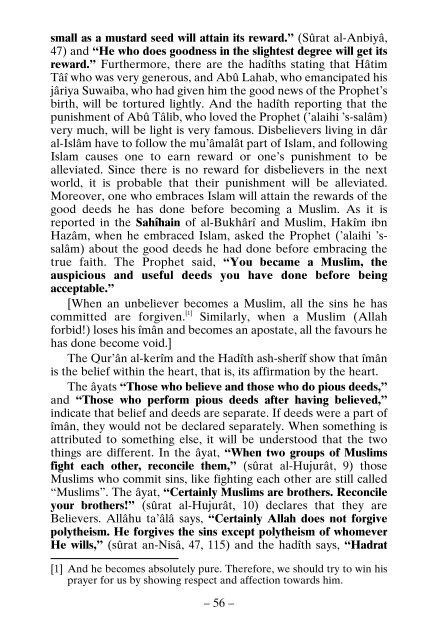Islams Reformers
The bigotry of the religion reformers or bigots of science who surfaced lately to blame all previous scholars, basic fundamental beliefs or practices
The bigotry of the religion reformers or bigots of science who surfaced lately to blame all previous scholars, basic fundamental beliefs or practices
Create successful ePaper yourself
Turn your PDF publications into a flip-book with our unique Google optimized e-Paper software.
small as a mustard seed will attain its reward.” (Sûrat al-Anbiyâ,<br />
47) and “He who does goodness in the slightest degree will get its<br />
reward.” Furthermore, there are the hadîths stating that Hâtim<br />
Tâî who was very generous, and Abû Lahab, who emancipated his<br />
jâriya Suwaiba, who had given him the good news of the Prophet’s<br />
birth, will be tortured lightly. And the hadîth reporting that the<br />
punishment of Abû Tâlib, who loved the Prophet (’alaihi ’s-salâm)<br />
very much, will be light is very famous. Disbelievers living in dâr<br />
al-Islâm have to follow the mu’âmalât part of Islam, and following<br />
Islam causes one to earn reward or one’s punishment to be<br />
alleviated. Since there is no reward for disbelievers in the next<br />
world, it is probable that their punishment will be alleviated.<br />
Moreover, one who embraces Islam will attain the rewards of the<br />
good deeds he has done before becoming a Muslim. As it is<br />
reported in the Sahîhain of al-Bukhârî and Muslim, Hakîm ibn<br />
Hazâm, when he embraced Islam, asked the Prophet (’alaihi ’ssalâm)<br />
about the good deeds he had done before embracing the<br />
true faith. The Prophet said, “You became a Muslim, the<br />
auspicious and useful deeds you have done before being<br />
acceptable.”<br />
[When an unbeliever becomes a Muslim, all the sins he has<br />
committed are forgiven. [1]<br />
Similarly, when a Muslim (Allah<br />
forbid!) loses his îmân and becomes an apostate, all the favours he<br />
has done become void.]<br />
The Qur’ân al-kerîm and the Hadîth ash-sherîf show that îmân<br />
is the belief within the heart, that is, its affirmation by the heart.<br />
The âyats “Those who believe and those who do pious deeds,”<br />
and “Those who perform pious deeds after having believed,”<br />
indicate that belief and deeds are separate. If deeds were a part of<br />
îmân, they would not be declared separately. When something is<br />
attributed to something else, it will be understood that the two<br />
things are different. In the âyat, “When two groups of Muslims<br />
fight each other, reconcile them,” (sûrat al-Hujurât, 9) those<br />
Muslims who commit sins, like fighting each other are still called<br />
“Muslims”. The âyat, “Certainly Muslims are brothers. Reconcile<br />
your brothers!” (sûrat al-Hujurât, 10) declares that they are<br />
Believers. Allâhu ta’âlâ says, “Certainly Allah does not forgive<br />
polytheism. He forgives the sins except polytheism of whomever<br />
He wills,” (sûrat an-Nisâ, 47, 115) and the hadîth says, “Hadrat<br />
[1] And he becomes absolutely pure. Therefore, we should try to win his<br />
prayer for us by showing respect and affection towards him.<br />
– 56 –

















